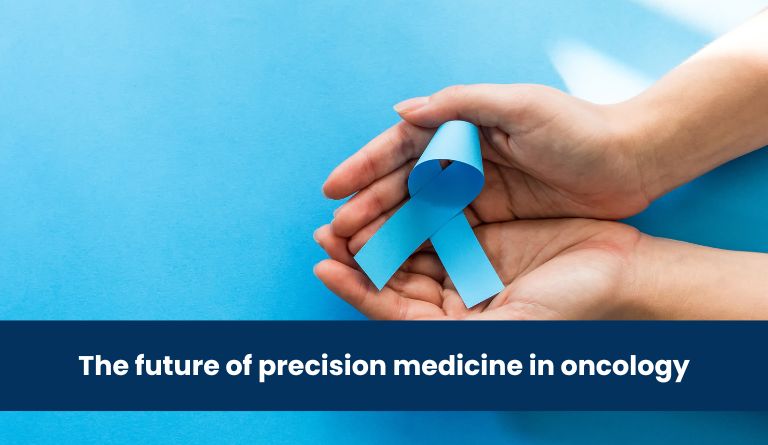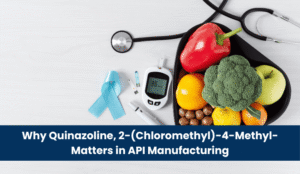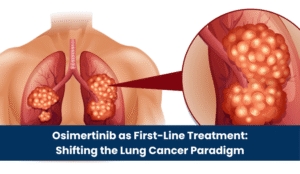Cancer. Even the word carries weight, doesn’t it? For generations, it often felt like a battle fought with broad strokes – treatments designed for the ‘average’ patient, with the hope that they’d work for the individual. But what could happen should the world be able to change that? How would it be to have treatment as unique as the individual being treated, and as distinct as the biology of their disease? That is the strong potential of precision medicine in oncology, a revolution that is transforming our perception and treatment of cancer, bringing new hope where it is most critical. This is not science fiction; this is the coming reality of cancer care.
What Is Precision Oncology?
Think of precision oncology, a core pillar of precision medicine in oncology, as moving away from a ‘one-size-fits-all’ approach. Instead, it focuses intensely on the unique characteristics of your cancer. This involves digging deep into the genetic makeup of the tumour itself, understanding the specific mutations that drive its growth, and sometimes even analysing one’s genetic profile. The goal? To identify the most effective targeted cancer therapies designed to hit those specific molecular weak spots, while ideally sparing healthy cells more effectively than traditional chemotherapy or radiation. It’s about matching the right drug to the right patient at the right time – the essence of personalised cancer treatment.
How Genomics Is Transforming Cancer Treatment
The engine driving this transformation is genomics – the study of all our genes. Advanced technologies now enable scientists to rapidly and increasingly affordably sequence a tumour’s DNA and RNA. This genomic profiling reveals the specific “mistakes” or mutations that caused the cell to become cancerous and keep growing uncontrollably. Identifying these mutations is akin to finding the cancer’s Achilles’ heel.
This knowledge directly informs treatment decisions. For instance, a lung cancer patient whose tumour has a specific EGFR mutation might respond exceptionally well to an EGFR inhibitor drug – a prime example of targeted cancer therapies. Without genomic testing, that patient might have received a less effective standard chemotherapy regimen. This level of insight is fundamental to modern precision oncology. The journey from discovery to treatment relies heavily on specialised active pharmaceutical ingredient manufacturers. Companies like Bulat Pharmaceutical, as experienced pharmaceutical ingredient manufacturers, play a crucial role in producing high-purity, complex API raw materials required for these sophisticated targeted cancer therapies, ensuring the foundation of these treatments meets stringent standards.
The Role of AI and Big Data in Personalised Oncology
Genomic data is complex and vast. This is where Artificial Intelligence (AI) and Big Data play a crucial role as indispensable partners in precision medicine in oncology. Imagine the sheer volume of information generated from thousands, even millions, of cancer genomes, combined with treatment histories and patient outcomes. Making sense of this manually is impossible.
AI algorithms excel at finding hidden patterns and connections within these massive datasets. They can help:
- Predict Treatment Response: Analysing a patient’s tumour profile against similar historical cases to forecast how well they might respond to specific therapies.
- Identify New Targets: Spotting previously unknown genetic alterations that could be exploited for new drug development.
- Optimise Clinical Trials: Matching the right patients to the most promising new therapies faster.
Big Data platforms aggregate information globally, accelerating research and refining treatment guidelines. This continuous learning loop is vital for advancing personalised cancer treatment on a global scale.
AI & Big Data in Precision Oncology: Key Functions
| Function | Impact |
| Genomic Pattern Recognition | Identifies complex mutation signatures and potential drug targets missed by manual analysis. |
| Predictive Analytics | Forecasts individual patient responses to specific therapies based on molecular profiles. |
| Clinical Trial Matching | Efficiently connects eligible patients with relevant trials based on their unique cancer biology. |
| Real-World Evidence Analysis | Analyses outcomes from diverse patient populations to continuously refine treatment protocols. |
Immunotherapy and Precision: A Powerful Combination
Immunotherapy, which harnesses the body’s immune system to fight cancer, has been a game-changer. But not everyone responds equally. Precision oncology is making immunotherapy even more powerful by helping us understand why it works.
Biomarker testing is key here. Tests such as PD-L1 expression, tumour mutational burden (TMB), or microsatellite instability (MSI) status help predict the patients who are most likely to benefit from specific immunotherapies. Furthermore, precision oncology is driving the development of combination therapies, which pair immunotherapies with targeted cancer therapies or other agents tailored to overcome a tumour’s specific resistance mechanisms. This synergy represents the cutting edge of personalised cancer treatment.
The Future of Anti-Infective Medicine: What Lies Ahead?
While our focus is on oncology, the principles of precision medicine are also transforming other fields. In anti-infectives, the future lies in rapid, precise diagnostics to identify pathogens and their resistance profiles at the point of care. This allows for highly targeted antimicrobial therapy – the right drug, for the right bug, at the right time. This shift demands equally precise and reliable drug manufacturing. Active pharmaceutical ingredient companies, particularly those specialising in complex API manufacturing, are essential. High-quality API raw materials, produced under stringent conditions by reputable pharmaceutical ingredient manufacturers, form the bedrock of effective and safe targeted anti-infectives. Companies focused on innovation in pharmaceutical manufacturing, including API manufacturer leaders such as Bulat Pharmaceutical, contribute significantly to this evolving landscape, ensuring the supply of critical components for next-generation treatments across various therapeutic areas.
Building the Future Together: Bulat Pharmaceutical’s Commitment to Precision
The future of precision medicine in oncology is incredibly bright, moving us steadily towards an era where cancer treatment is truly individualised. Genomics provides the map, while AI and Big Data help us navigate it, and sophisticated therapies, such as targeted drugs and precision-guided immunotherapy, offer powerful new weapons. While challenges remain – like ensuring equitable access and managing complex data – the trajectory is clear.
This progress relies on a robust ecosystem, from groundbreaking research to reliable manufacturing. The consistent production of high-purity active pharmaceutical ingredients by dedicated active pharmaceutical ingredient manufacturers and pharmaceutical ingredients manufacturers is fundamental. As active pharmaceutical ingredient companies continue to innovate in pharmaceutical manufacturing and API manufacturing, they support the development and delivery of these life-changing targeted cancer therapies. Precision oncology isn’t just changing treatments; it’s changing outcomes and offering renewed hope – a future where cancer is managed with unprecedented accuracy and compassion, tailored uniquely to you.






